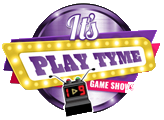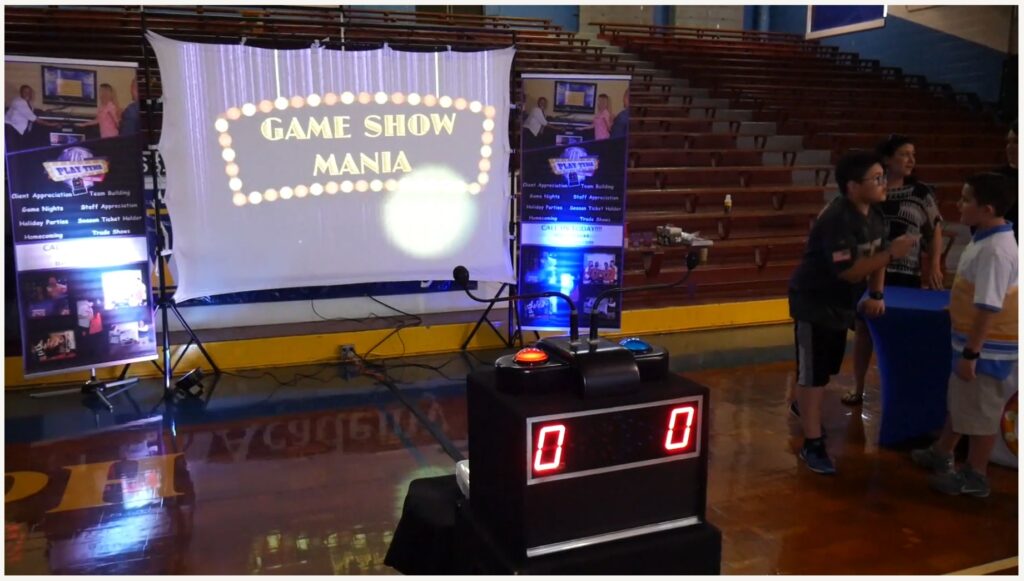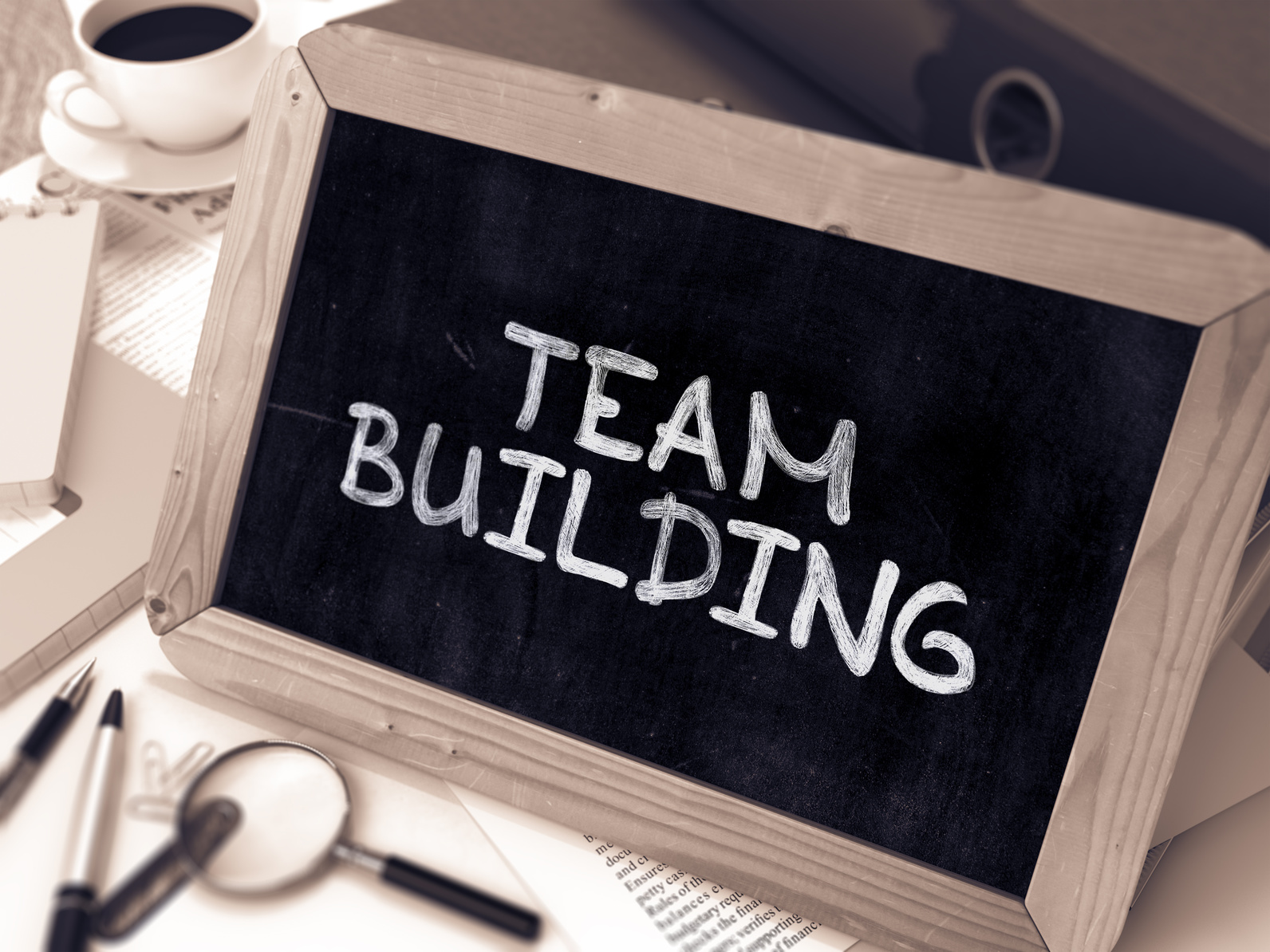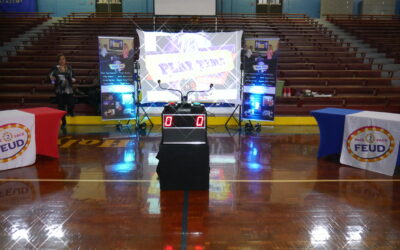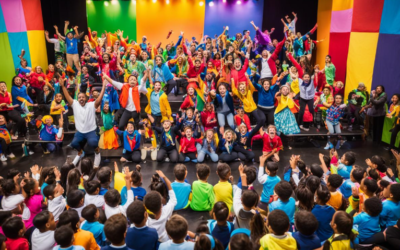Looking for a fun way to spend family time together? Consider hosting a trivia game show for your elementary school. It’s a mix of excitement and learning. Imagine the smiles on the students’ faces as they answer questions and see their scores.
This event can show that learning doesn’t have to be boring. It can be fun and engaging. Hosting a trivia game show is a great way to make learning exciting.
Hosting a trivia game for elementary students makes learning fun and inclusive. We’ll give you tips on picking a venue and creating engaging questions. Learn how to make every moment count at your event.
Discover our expert tips to host a trivia game show that everyone will remember. It’s time to master the art of hosting a trivia game show that’s both fun and educational.
Key Takeaways
- Learn why hosting a trivia game show for elementary students makes learning exciting and fun.
- Explore how to choose the right venue for maximizing engagement at your event.
- Craft engaging trivia questions tailored for elementary school students.
- Use multimedia elements and props to make the game interactive.
- Find tips on how to effectively organize and run your trivia night.
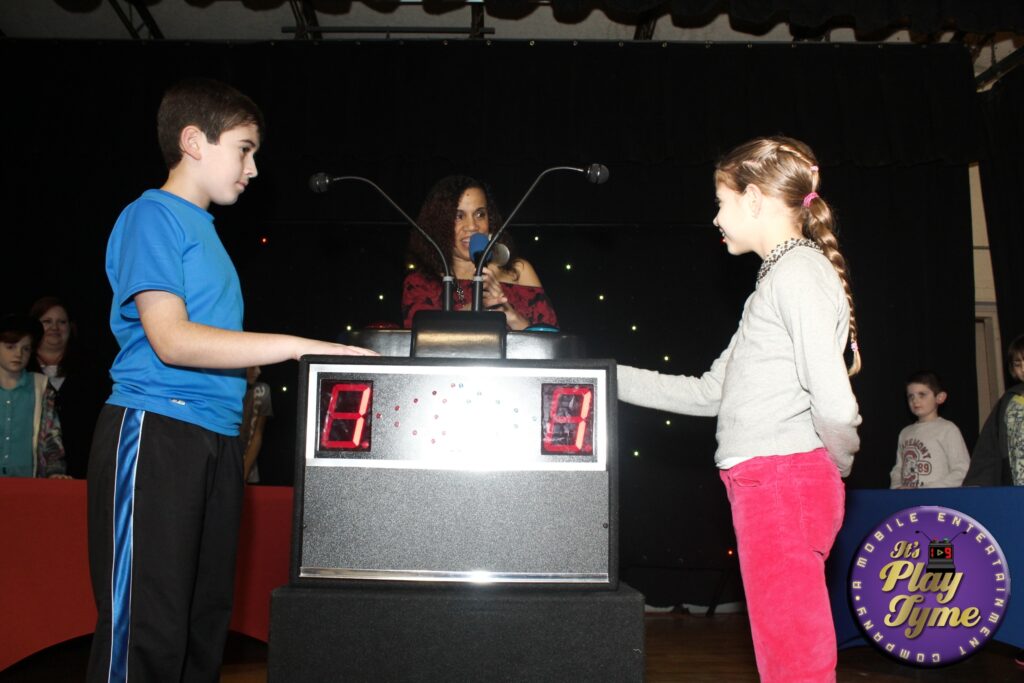
Book a Interactive Game Show!
Call us today. TV Style Game Shows for kids are our specialty. Let’s Play!
Benefits of Hosting a Trivia Game in Elementary Schools
Hosting a trivia game in elementary schools has many educational perks. It makes learning fun and boosts teamwork and critical thinking in young students. Let’s dive into these benefits.
Enhances Learning Through Fun
Trivia games make learning fun in elementary schools. They present facts in an engaging way, grabbing students’ attention. Kids remember more when they’re having fun and actively participating.
This mix of fun and learning creates lasting memories. It’s a great way to make education stick.
Promotes Teamwork and Collaboration
Trivia games are perfect for teamwork and collaboration. Students work together to answer questions, learning the value of cooperation and communication. This helps build a sense of community and problem-solving skills.
Improves Critical Thinking Skills
Trivia games also boost critical thinking in elementary students. They need to analyze information, recall facts, and think strategically. This sharpens cognitive abilities and problem-solving skills, key for doing well in school.
Trivia games in school can be both fun and educational. With the right approach, they benefit students’ overall growth.
Choosing the Right Venue for Your Trivia Game Show
Finding the perfect spot is key for a trivia game show for students. The right venue makes the event a hit and keeps everyone happy. Here are some top picks for your event:
School Gymnasiums and Cafeterias
School gymnasiums and cafeterias are top choices for hosting a trivia game show. They have lots of room for big groups and are easy to get to. Plus, setting up for the event is usually simple.
Community Centers and Town Halls
Community centers and town halls are also great for a trivia game show. They can fit lots of people, making them perfect for big events. These places have things like parking and easy access, which makes the event better for everyone. They also have what you need for a fun trivia night.
Outdoor Spaces and Playground Areas
For a laid-back vibe, think about outdoor spots and playgrounds. These places make the trivia game show fun, especially when the weather is nice. You can set up in creative ways and add fun activities. Just be ready for bad weather.
Picking the right place is crucial for a great trivia game show for students. Each spot has its own perks, so think about what your guests like. A good location and setup mean everyone will have a blast.
How to Organize a Trivia Game Show for Students
Organizing a trivia game show can be a fun and enriching experience. Here are key tips for hosting a successful trivia game at school. These tips will help make the event smooth and engaging for everyone.
Step-by-Step Planning Checklist
- Establish clear objectives and goals for the trivia game.
- Choose a date and time that works for most participants.
- Decide on the format and categories of questions.
- Set up teams or allow students to compete individually.
- Develop a comprehensive set of rules that must be communicated in advance.
- Create a timeline for the game’s progression, including intermissions.
- Prepare rewards or incentives for winning participants to maintain excitement.
- Ensure all logistical aspects such as lighting, seating, and sound systems are covered.
Gathering Necessary Materials and Supplies
Gathering the right materials and supplies is key for a trivia game show’s success. Here are the essentials you’ll need:
- Question cards that cover a variety of categories and difficulty levels.
- Answer sheets and pens for students to record their responses.
- A timer to keep track of each round.
- A scoreboard to update scores visibly for all participants.
- Prizes for winners to boost engagement and motivation.
- Audio-visual equipment if using multimedia elements or any electronic scoring.
Remember to have backups of everything to avoid any issues during the game. These tips will help ensure your trivia game show is a success.
Tips for Creating Engaging Trivia Questions for Elementary School Students
Creating fun trivia questions for elementary school students needs a careful plan. It’s important to make sure the questions are inclusive, challenging, and exciting.
Balancing Easy, Medium, and Hard Questions
Plan to have a mix of easy, medium, and hard questions. This mix keeps students interested and meets different knowledge levels. Everyone gets to feel accomplished and challenged.
Easy questions make students feel good, while hard ones make them think deeply.
Include a Variety of Categories
It’s key to have a mix of categories for trivia questions. Include science, literature, history, math, and pop culture. This way, every student can find something they like and learn something new.
Fact-Checking and Accuracy
It’s very important to check facts in trivia questions for elementary school students. Make sure all questions and answers are correct. This makes the game trustworthy and educational.
Right and true content builds trust and helps students learn a lot.
Interactive Trivia Games for Children: Making It Fun
Making interactive trivia games for kids more exciting can really help them learn more. By adding fun elements, you can make the game both memorable and educational for your young players.
1 – Using Multimedia Elements
Use things like audio clips and visual aids to reach kids who learn in different ways. For instance, add short videos, bright pictures, and sounds to questions. This makes the game more lively and helps kids remember what they learn.
2 – Incorporating Game Props and Visuals
To make the game setting more fun, add game props and decorations. Things like buzzers, scoreboards, and colorful banners make the game exciting.
You can also use props that fit the trivia theme, like historical items or science models. This makes the game feel real and makes learning more fun.
Setting Up the Game Show Environment
When planning a trivia game at school, making the setting fun and engaging is key. Arrange the seating so that students can talk and see each other. This makes the game more interactive and fun. Everyone should be able to hear the questions clearly too.
Adding decorations and themed elements sets the mood for the game. Use visuals or props that match your questions to make it more real. This makes the game more exciting and keeps students interested.
It’s important to have everything you need ready and within reach. Make sure you have scorecards, pens, and any other equipment you need. This helps keep the game running smoothly and keeps students focused.
- Arrange seating to foster interaction
- Use decorations and themed elements
- Organize materials and supplies beforehand
By following these tips, you can make the trivia game fun and educational. Students will stay engaged, learn something new, and have a great time.
Host a Trivia Game Show for Your Elementary School
Hosting a trivia game show for your elementary school needs careful planning and creativity. Start by making a game format that’s both educational and fun. Use topics from the school curriculum to make learning exciting.
To host a trivia game show for your elementary school, follow these steps:
- Kickoff with Excitement: Start with a captivating introduction to set a positive tone. An engaging opening gets students excited and builds anticipation.
- Teams and Rules: Put students in teams for better teamwork. Make sure team sizes are balanced. Explain the rules clearly to avoid confusion and ensure fair play.
- Question Variety: Create a mix of trivia questions, from easy to hard. Questions should cover various subjects to test a broad knowledge base.
- Engage with Multimedia: Add multimedia like videos, images, and audio clips. This makes the quiz more dynamic and fun.
- Interactive Props: Use exciting props and visuals to keep the energy up. Visual aids help students understand better and stay focused.
- Track Scores Transparently: Use a digital scoreboard to keep track of points. Clear scoring builds trust and keeps everyone excited.
- Announce Winners and Rewards: End with announcing the winners and giving out prizes. Recognizing students motivates them and ends the event on a high note.
By following these steps, you can make a trivia game show for your elementary school fun and educational. The goal is to mix fun with learning for an engaging experience for everyone.

Activities for camps schools carnivals fun NJ
Book a Interactive Game Show!
Call us today. TV Style Game Shows for kids are our specialty. Let’s Play!
Selecting the Perfect MC for Your Event
Finding the right master of ceremonies (MC) is key for a successful elementary school trivia game show. The right MC can greatly improve audience engagement and fun. Here are some tips to help you choose:
Qualities to Look For
Look for certain qualities in an MC to boost your trivia game’s vibe:
- Charisma: A great MC should be lively and engaging to grab everyone’s attention.
- Articulation: They need to speak clearly so everyone can understand the rules and questions.
- Confidence: They must stay calm and confident, even when the kids get excited.
- Sense of Humor: A bit of humor can make the event more fun for all.
Training and Preparation Tips
Training and preparation are crucial for a great event. Here’s how to get your MC ready:
- Familiarity with Content: Make sure the MC knows the trivia questions and the game’s format well.
- Rehearsals: Practice with the MC to boost their confidence and clarity.
- Audience Management: Teach the MC how to keep the audience focused and interested.
Engaging with the Audience Effectively
To really connect with the audience, the MC should reach out personally:
- Interactive Questions: Get the audience involved with spontaneous questions or jokes.
- Recognition: Thank everyone for their support and participation.
- Positive Reinforcement: Keep the mood up by giving praise and encouragement.
By picking the right MC and making sure they’re ready, you’ll have a trivia game show that elementary school students will remember.
Fun Trivia Game Ideas for Kids
Planning fun trivia games for kids is both exciting and educational. You can make it more engaging by adding themes and hands-on activities. These make learning fun for young learners.
a – Themed Trivia Nights
Themed trivia nights make the games more exciting for kids. You can choose themes like superheroes, animals, or space exploration.
For example, a night focused on Marvel superheroes can include questions about characters and movies.
This approach captures kids’ interests and makes learning fun. It turns trivia nights into memorable events.
b – Interactive and Hands-On Activities
Add interactive and hands-on activities to make the experience better. Kids learn more when they act out clues or draw answers. This way, you cater to different learning styles and include everyone.
For instance, drawing activities let kids show their answers on a whiteboard. This makes the game fun and visually appealing.
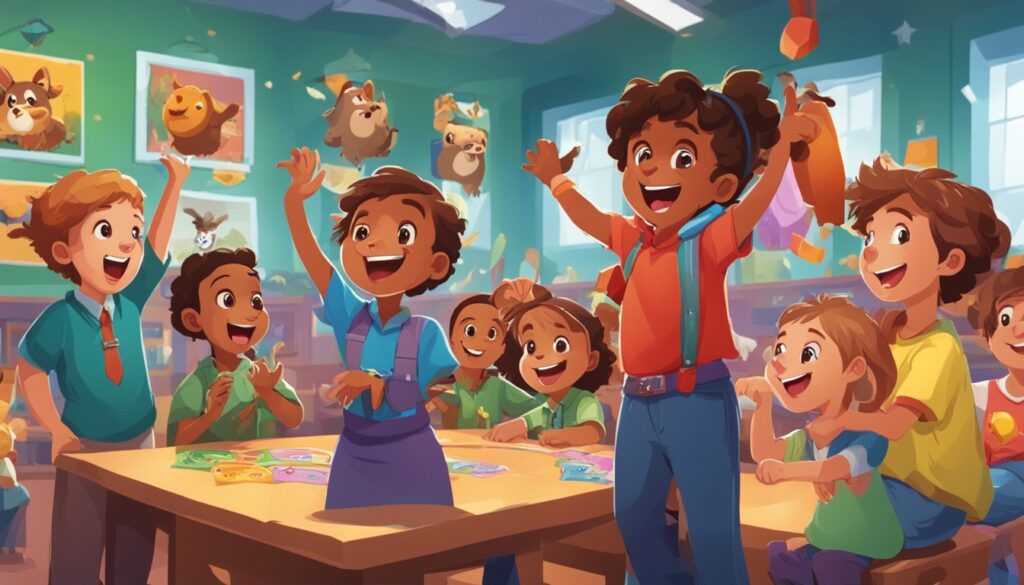
When planning trivia games for kids, focus on being interactive and using themes. These elements create a lively learning space. Kids stay engaged and develop a love for learning with a mix of themes and hands-on activities.
Preparing and Distributing Trivia Materials
Getting your trivia materials ready and out to everyone is key for a great game show. Here’s a simple guide to help you do it well.
Start by making a set of questions that are fun and teach something new. Make sure the questions are at different levels of difficulty to keep everyone interested. After you have your questions, make sure you have answer sheets ready for easy checking.
Here’s how to get the materials to everyone without a hitch:
- Put all your questions, answer sheets, and pens in labeled packets.
- Have volunteers or staff give out the materials to everyone before the game begins.
- Have extra materials ready in case you need them.
Getting your trivia materials ready and out to everyone helps make sure the game is fun and smooth. With everything set, your trivia game show is sure to be a hit.
Tips for Keeping Score Fairly and Efficiently
Keeping score fairly and efficiently is key to a great trivia game show. Using the right tools and methods makes sure everyone has a good time. We’ll look at both automated and manual ways to keep scores right and fast.
Automated Tools and Software
Automated tools and software change the game for scoring trivia. They make scoring easy and cut down on mistakes. Tools like Kahoot!, Quizizz, and Google Forms make tracking points live and simple.
- Kahoot!: Offers a dynamic and engaging scoring system with live updates.
- Quizizz: Provides detailed analytics and automatic score calculation for quizzes.
- Google Forms: Can be customized with scoring rules and linked to Google Sheets for real-time updates.
Manual Scoring and Tiebreakers
Even with automated tools, having a manual scoring system is key for small events or as a backup. A clear tiebreaker plan is vital when scores are even. Here’s how to set up manual scoring:
- Appoint at least two scorekeepers to check each other’s work.
- Use score sheets to add up points after each round.
- Set up tiebreakers like more trivia questions or sudden-death rounds.
| Scoring Method | Pros | Cons |
|---|---|---|
| Automated Tools | Accurate, real-time updates, easy to use | Requires internet access, possible technical issues |
| Manual Scoring | Flexible, no tech needed, personal touch | Time-consuming, prone to human error |
Ways to Make a Trivia Game Show Exciting for Kids
Organizing a trivia game show for kids requires keeping them interested and energetic. Here are some tips to make it exciting for them.
Offer Prizes and Incentives
Offering prizes and incentives is a great way to excite kids for a trivia game show. Kids enjoy competing for rewards like small toys, certificates, or extra recess time. This approach motivates them to participate and adds a fun competitive edge.
Encourage Costumes and Themes
Kids dressing up in costumes based on themes can add excitement to your trivia game show. Whether it’s superheroes, animals, or historical figures, themed outfits spark their imagination. It makes the event more than just answering questions.
Include Mini-Games and Break Activities
Adding mini-games and break activities keeps the energy up and keeps kids engaged. Quick scavenger hunts, dance breaks, or short puzzle games are great intermissions. They make the main event even more thrilling.

To wrap it up, there are many ways to make a trivia game show exciting for kids. Offering prizes, encouraging costumes, and adding mini-games are key. These elements will make your event unforgettable.
Conclusion
Hosting a trivia game show for your elementary school is a great way to make learning fun. It helps students love knowledge more. The event also boosts teamwork and sharpens critical thinking skills.
Planning is key to a successful trivia game show. Pick a good venue, prepare fun trivia questions, and find a great MC. Adding multimedia and game props makes the event more exciting for everyone.
To host a trivia game show, focus on preparation and keeping the audience engaged. Make sure the event is both fun and educational. Aim for a memorable experience where everyone leaves happy and more knowledgeable.
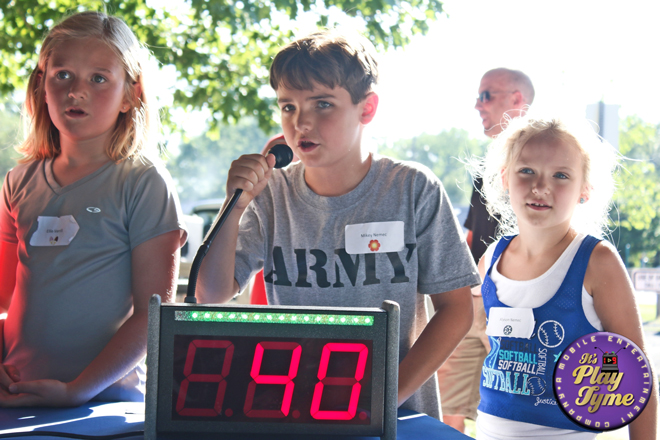
Activity For Kids in New Jersey and New York
